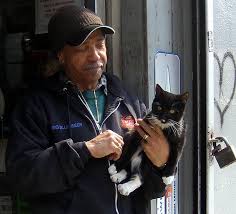By Leslie Eckford
We all benefit when we share our home with a loving pet. Over one’s life, we can think back to the favorite dog of childhood, the first cat that we adopted from the SPCA, how a particular animal friend played for hours with us.
That special connection and communication that we share with a pet does not end as we grow older. In fact, it may grow in significance as long-standing human relationships, such as friends and family change and pass away. One may spend less of the day with familiar faces. In an elderly person’s home, the family pet can offer warmth and unconditional love, becoming a thread to the presence and love of previous pets and homes and self history.
Yet, we know that welcoming a new pet into an elder’s home, especially if they need the assistance of a caregiver, can present a challenge. One person described her frustration when her elderly, frail and mostly immobile father adopted 2 lab puppies. “How is he going to take care of them? They are going to knock him over and break his hip!” However, it was hard for her to ignore how overjoyed her father was with his new housemates. He thrived on their energy and had a new sense of purpose. And, yes, the house was a mess!
While it is clearly wise to avoid puppies with boundless energy at a certain time of life, there are other options. Animal shelters are filled with pets of many ages and temperaments looking for homes. The process of finding the right companion may take time. This task can be aided by looking at online websites of animal societies, thus taking out some of the leg work that could be tiring to an elder. This could be a project that a caregiver could assist with, especially as they have a unique understanding of the needs of the person. If having a pet at home is not a wise choice (too small an apartment, not enough opportunity for the pet to get exercise or allergies), then regular visits to the local humane society can be a solution. That time to have a cat in one’s lap or watch a playful puppy can produce a smile and contentment that brings back a happy memory.
If you think that this is too complicated to be possible for an elder in your life to have a new pet, enjoy this lovely photo essay from Japan. Here, an 87 year old woman discovers the richness of relationship with a very special cat that she found. The photos are by her granddaughter, a professional photographer.





2 Comments
Love this article. I recently read a fascinating article in the January 31 issue of the New York Times magazine about pairing abused and neglected parrots with veterans who have PTSD. Makes me wonder how that might work with elders who have dementia. Evidently parents are such social creatures when they are with other parents that when they don’t have that option they bond very closely with humans.
Very interesting article. I have seen first hand how animals can reach people who otherwise are uncommunicative. I just read a fascinating article in the January 31st, 2016 New York Times magazine about pairing neglected and abused parrots with veterans who have PTSD and other mental health disorders. These veterans have not responded to traditional therapy and medications, but have bonded with these parrots and found new hope and life!